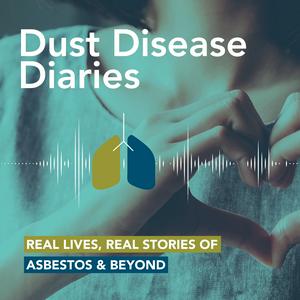Asbestos. Not Here. Not Anywhere.
Just this week, a new legal battle is taking place in Indonesia. Activists who successfully secured a court ruling for mandatory labelling of asbestos-containing products as “Hazardous” are now facing defamation lawsuits from a global pro-asbestos lobby group representing some of the world’s largest asbestos producers, including those based in Russia and China.How can this happen? In this episode, James O’Loghlin speaks with Phillip Hazelton, Senior Advisor at Union Aid Abroad – APHEDA, the international development agency of the Australian union movement, who provides a fascinating insight into the global use of asbestos.Phillip brings more than 30 years of experience working across Southeast Asia, where asbestos-related diseases often go undiagnosed due to limited capacity to diagnose. And if it can’t be diagnosed – does that mean there is no disease? In many countries this is exactly what’s happening – but we know that it is widespread and increasing. In Indonesia alone, the Global Burden of Disease study estimates more than 1,000 people die each year from asbestos-related diseases. Yet public awareness remains low, and the pro-asbestos lobby continues to spread misinformation—including the dangerous myth that “white asbestos” can be used safely.This conversation covers: The aims and impact of Union Aid Abroad-APHEDA’s regional asbestos campaign in Cambodia, Indonesia, Lao PDR and Vietnam.The persistence of asbestos use globally, including countries still exporting and importing asbestos-containing products.The disinformation campaigns by the pro-asbestos lobby and the strategies used to counter them.The barriers health professionals face in diagnosing asbestos-related diseases in countries where asbestos is still in circulation. If they can’t diagnose, there is no problem. The importance of international collaboration, especially in listing hazardous substances like chrysotile asbestos under the Rotterdam Convention. As part of the global effort to eliminate asbestos-related diseases, Union Aid Abroad – APHEDA, in close collaboration with ADDRI and with support from the Australian Government agency ASSEA, has been delivering specialist clinical training in the region. In recent years, teams have travelled to Indonesia, Vietnam and Laos, equipping local health professionals with the skills to identify and diagnose asbestos-related diseases.In late August, a specialist ADDRI training team will travel to Cambodia to continue this vital work. As Phillip says ‘’We fought long and hard for workers’ rights in Australia and compensation for victims, people in our neighboring countries shouldn’t be dying unnecessarily.” Phillip Hazelton has spent more than 35 years working in international development, project management, industrial relations and OHS — including 18 years based in Southeast Asia. His extensive experience includes senior roles with Union Aid Abroad – APHEDA, the Australian Manufacturing Workers’ Union, and the International Labour Organization (ILO).Phillip led the Ban Asbestos campaign for seven years, coordinating efforts to reduce the incidence of asbestos-related diseases through policy change, worker education, and regional partnerships. He now works as a Senior Advisor based in Sydney. Union Aid Abroad APHEDA (Australian People for Health, Education and Development Abroad) is a non-government organisation of the Australian union movement and serves as the international aid agency of the Australian Council of Trade Unions. It receives funding from the Federal Government. You can find out more about Union Aid Abroad – APHEDA – here.Learn more about the Asbestos and Silica Safety and Eradication Agency (ASSEA) here.Find out about ADDRI’s international training programs here.To find out more about ADDRI, visit our website. Thank you to our Podcast Interviewer and host James O’Loghlin If you have any questions or comments, please email
[email protected]



